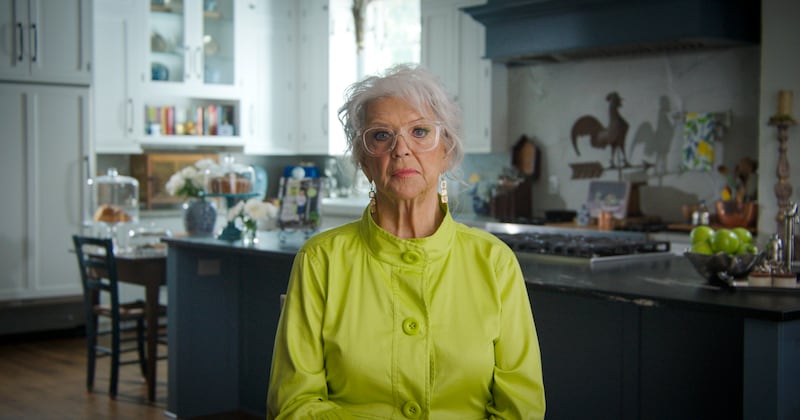Was anybody loved more in all 50 states than Paula Deen? She was all over television in the 2000s, with her own series and regular guest spots on various talk shows, including The Oprah Winfrey Show, enchanting audiences with her southern charm and butteriffic recipes.
That all changed in 2013, when Deen found herself at the center of a racism scandal that shocked America and sent her multi-million dollar empire crumbling to the ground. Twelve years after Deen’s reign as America’s favorite cook came to an end, a new documentary at the Toronto International Film Festival, Canceled: The Paula Deen Story, shines a new light on the scandal.
On Jan. 31, 2012, over a year before the racism accusations became public, Deen received a threatening legal letter. It came from a lawyer regarding a planned lawsuit from Lisa Jackson, the general manager at Uncle Bubba’s Seafood and Oyster House, a restaurant owned by Deen and run by her younger brother, Bubba.
The letter suggested that Deen’s name would be dragged through the mud and that they had information that could pose a threat to her career. But if Deen settled for $1.25 million, they would drop the suit. If Deen refused, there would be a nationwide press release aimed at taking Deen down.
Deen’s lawyers and confidants suggested she pay the money to make this go away, arguing to her that it’s the unfortunate price of fame. But Deen saw it differently. “That’s bulls–t,” Deen says in Canceled about paying the settlement. “Bubba and I both agreed that it was not right to pay someone for something that is not true,” she says.
Refusing to pay, Jackson’s lawsuit went forward. It was full of allegations about Bubba, claiming that he frequently used racist and sexist language, as well as watched pornography at work and regularly drank on the job. On May 17, 2013, Deen was deposed as part of the lawsuit. Canceled alleges that Deen was deposed by a lawyer who specialized in medical malpractice, suggesting he was inappropriate for the task.
“My lawyer said, ‘Paula, it’s easy. Just tell the truth.’ I can do that,” says Deen. Under oath, Deen was asked if she had ever used the N word. Not in the presence of the plaintiff, but if she had ever used it in her life. Responding honestly, Deen said, “Of course.” Despite legal experts in Canceled stating that the question should have never been asked, arguing that it was irrelevant as it had nothing to do with Bubba’s restaurant, Deen’s lawyers didn’t object at the time.

Deen answered the question honestly. “Not one time did that attorney step up and say, ‘That’s not a legitimate question,’” Deen says.
Responding to the deposition question about when she had used the word, Deen said: “It may have been the day this Black man came to the bank and put a gun against my head.” In 1987, when Deen worked as a bank teller, a man came in and robbed the bank, placing a gun to her temple. After the incident, she went home to her husband and told him what happened, and that’s when she used the N-word in describing her experience.
It’s quite the revelation; a media hellstorm that reined down on Deen stemmed from what is allegedly a single use of the word that came after she was held at gunpoint.
Deen’s team hired a crisis management group to help with the backlash, but Deen says in the documentary that they only made everything worse, at a staggering cost of $50,000 a month. They pushed Deen to make an apology video, a statement she didn’t want to make.
“They told me I had to sit down and film an apology to this country,” Deen says with tears in her eyes. “I said, ‘I didn’t do anything wrong. I was involved in a deposition, and I told the truth.’ They said, “You did. You did do something wrong.’ I tried to do it, and they said it was not heartfelt at all. Do it again.’”
The crisis team was instructed to have her agent approve the video before sending it out into the world. “But before I could get out of there, they released it,” Deen says.
The videos were poorly received, with many pundits saying that Deen was insincere in her apology. The same day, Deen received word that she was fired by the Food Network.
“I must be a terrible person, and they were not going to be associated with a racist,” Deen says. “The rest was like dominoes,” she says, as all her sponsors stopped working with her. “In 24 hours, I lost everything,” Deen says. “To this date, I don’t know how many people lost their jobs, all for something I said in 1987.”
Canceled also claims that it was white people who led the charge against Deen, while many Black fans and celebrities were more sympathetic, acknowledging that her words were deeply hurtful, but that she wasn’t worthy of having her empire, and those who worked with her, taken down. Historian Michael Twitty suggests in the film that the media storm that engulfed Deen was part of a larger effort to distract the American public from systemic issues of racism, like stripping back the Voting Rights Act and the murder of Trayvon Martin.
The planned lawsuit fromLisa Jackson was ultimately settled with no sum of money awarded. Jackson made a statement that stated, “The Paula Deen I have known for more than 8 years, is a woman of compassion and kindness and will never tolerate discrimination or racism of any kind toward anyone.”
“But the damage had been done,” Deen said.
The post Paula Deen Swears She Isn’t Racist in New Documentary ‘Canceled: The Paula Deen Story’ appeared first on The Daily Beast.




